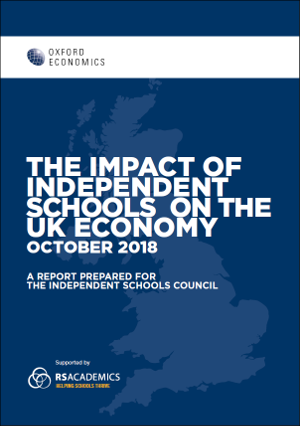Ungated Post | 03 Oct 2018
The impact of independent schools on the UK economy

Independent schools support £13.7 billion of UK GDP annually, associated with over 300,000 jobs and £4.1 billion of yearly tax revenues. They help the exchequer further by providing an alternative to state-funded education, and boost the economy’s long-term productive potential by improving educational outcomes.
In total, around 620,000 school pupils – some six percent of the national total – attend independent as opposed to state schools in the UK. Taking into account associated ‘indirect’ (supply chain) and ‘induced’ (wage-funded spending) impacts, these schools’ activities support £13.7 billion of GDP, 300,000 jobs, and £4.1 billion of taxation, via their impact on demand. The also save the UK taxpayer £3.5 billion per annum, as 530,000 of these pupils would otherwise be eligible for a state-funded school place. The schools also make a positive contribution to the economy’s supply-side.
As the sector’s educational outcomes are above-average, we estimate that they could boost the UK’s long-term growth rate by around 0.07% per annum, taking into account OECD research. As this growth shortfall is compounded year-on-year, the impact on annual GDP could be quite marked after several decades.
Our economic consulting team are world leaders in quantitative economic analysis, working with clients around the globe and across sectors to build models, forecast markets and evaluate interventions using state-of-the art techniques. Lead consultants on this project were:
Oxford Economics’ team is expert at applying advanced economictools that provide valuable insights into today’s most pressing business, financial,and policy issues.
To find out more about our capabilities, contact:
EMEA
Sam Moore
+44 (0)207 803 1415
Email
Americas
Hamilton Galloway
+1 (646) 503 3068
Email
Asia
Peter Suomi
+65 6829 7198
Email
Related Services

Post
The socio-economic impact of TikTok in Australia
This report provides the results of our economic modelling of TikTok’s economic contribution to the Australian economy, as well as the findings of survey research into TikTok’s users and Australian businesses. It looks at the real world impacts users report as well as the diversity of TikTok’s online communities.
Find Out More
Post
The German Music Industry: Investments and Payments to Artists
Our study "The German Music Industry: Investments and Payments to Artists", on behalf of the German Music Industry Association (BVMI), examines whether and how artists have benefited from the increased revenues of German music labels in recent years.
Find Out More
Post
Global Cruise Trends Report: March 2024
This report delves into research conducted in Q4 2023 across five key cruise markets, all indicating strong cruise demand. Our comprehensive market intelligence aims to equip the travel industry with insights into the significant growth potential in the cruise industry.
Find Out More